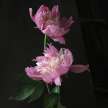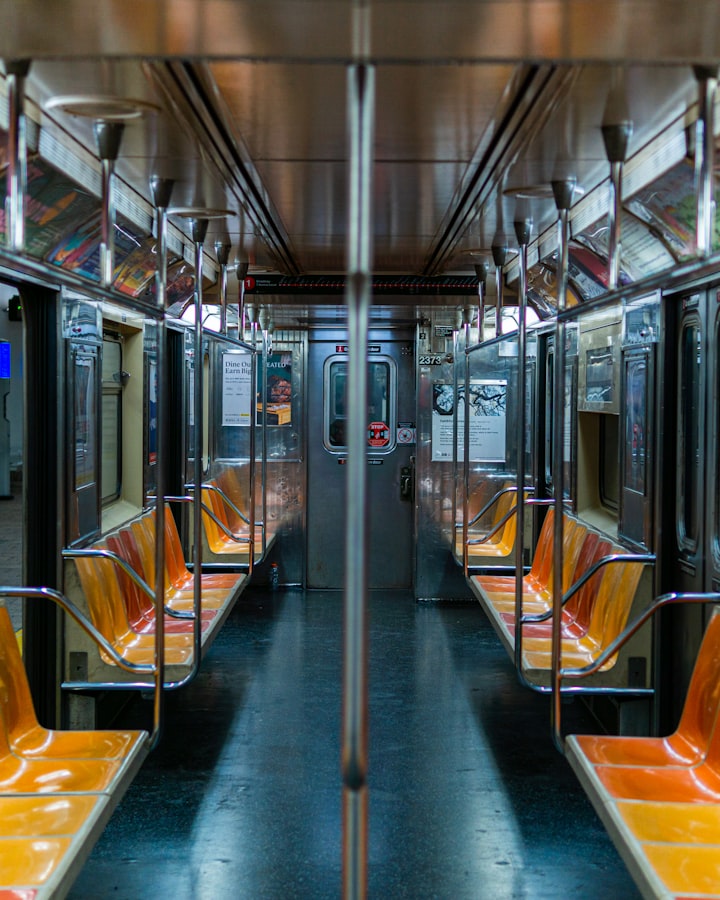
Bull Ryder was one of those people who grew into their names and used them. Trading with his name, he was down in the pit before computer screens turned living into a blur of lines, charging at the numbers and bellowing buys and sells with a single-minded determination that earned him the moniker “Bull of Wall Street”. He had started at the bottom as a clerk the day after finishing high school, no family money and no old seat on the exchange passed down to him, with a few thousand and a little bit of luck.
Things were real down there. The sweat and pushing and hoarse voices rising and falling made him feel alive. The aggression usually calmed him so he could sleep. although admittedly, sometimes the day’s tally made him stay up all night smoking and thinking about how to get even the next time around. The market was his heartbeat, the pit his fertile field.
The people were familiar. They followed their routines, each moving to their place on the floor like cows to their stanchions. They knew each other, how they thought, reacted to the daily news, and what they traded. It had some elements of dance but with only a little of its grace.
Bullard H. Ryder as he had been christened, lived up to his name in looks too. Massive and ponderous, with a solid neck, he split the crowds both on the sidewalk and down in the pit in two like Moses wading into the Red Sea or coming down the mountain angry, tablets in hand. When he held up his arms to sell, he looked every bit like a bull charging, hands forward like horns. He wore a thick gold ring with a blood-red carnelian intaglio bull adorning the top, the only thing that had caught his fancy after his first round of trading wins. It never failed to attract attention during a buy. He never took it off.
On Fridays, that roller coaster of trading days, he would be on the floor for the close and took up his stance in his spot shrugging smaller traders aside like flies, hardly noticing them. It was often a good day for buying as enthusiasm for work was flagging. Occasionally things took a turn upwards rose until Monday morning’s reality check at the open. On those Fridays, he might have something to sell too.
After the close, with his coworkers from the pit, mostly acquaintances, he’d sit at the bar at the White Horse, or another place, and order a round or two. His wife had left years ago with a guy that paid her a lot more attention.
After dinner, shepherd’s pie, fish and chips, or some other bar food offering, he’d walk over to Exchange Street and his one bedroom. He’d moved into it a couple of years ago. It was clean and excruciatingly vanilla as renovated Manhattan apartments tend to be. Its draw was an ok view which he felt was worth the extra shekels he doled out every month for the privilege. A bed and a computer monitor were all he needed. There were a couple of stools at the island he never used, a microwave, and a coffee pot. He sat on the sofa maybe twice a month, while on the phone with a contact in Hong Kong, or Japan, or London.
The only other sign of an outside world was the enormous grey tabby, Captain of Industry. Captain or Cap for short. The cat spent most of his waking hours on the windowsill watching birds fly back and forth, always crouching but never getting the opportunity to pounce. At night he and Bull would sleep back to back.
Cap had followed him up the street and into the building, passing by the doorman undetected. He had whisked his tail into the elevator right before the doors closed. Bull looked down at him. Cap looked up and started his bass purr, and there it was, a family.
Looking down from the apartment window, you could see the yellow cabs stop and start below as the corner light changed from red to yellow to green and back. All day, all night, trucks rumbling, the occasional siren, and that red light green light up and down like the bars on the Forex chart, in the city that never sleeps.
If he went out, that was seldom, it was crosstown to catch the Kenny Barron Trio underground at the Vanguard. With patrons packed in like sardines, it had the feeling of the trading floor, and Barron’s playing, especially a piece like “Kojo no Tsuki”, with the moon over a castle ruin, had the jump and thrust of a market day. Barron would play the theme, just like looking at the open, and his piano flashes would play like the bucking wildness of the charts. Sometimes, during a three-week run of shows, Bull would go twice or three times to catch the nuances of the night.
He had made it through the downturns by paying attention. Some traders had lost their shirts, but the savvy ones were smart enough to cancel those new house contracts the year before. There were always closes on the holidays and weekends, but the market was almost always trading somewhere. Trading floor closes in New York were becoming more frequent to stop precipitous drops in value. This, since off the floor computer trading created a whole other level of volatility in the market. Stampedes by the general public, once infrequent but devastating, were now more common, but more predictable and partially slowed or controlled by the shutdowns.
Then the unplanned for happened. A virus started to shut down the entire city. The St. Patrick's Day Parade, a city institution, was canceled for the first time since 1762. A few people working at the Big Board came in sick, and the virus spread in the building. Soon the whole of New York City was battling this monster illness. Stocks took a plunge, one of the worst. The floor was closed.
The first week of the shutdown Bull stayed home with his computer and Cap. The market took a further downturn. He was calling in his trades. Nobody went in or out of his building except to walk their dogs or come back bearing out-sized packages of toilet paper. His cleaning lady’s husband got sick, so she stopped coming. Everyone wore masks, and the reporting changed to the daily death toll. He tracked those charts with the same frequency as everything else. At night he would stare broodingly into the screen, nothing else to do and nowhere to go.
The second week, he started walking over to gaze up at the pediment at Number 11 before the open, staring up. Then he would walk home and wake up the computer again for the trading day. Captain did not quite know what to make of this behavior, but he started to take up a spot behind the monitor for a few hours instead of sitting on the windowsill. Some birds built a nest there, seemingly unconcerned that a large cat was sitting right behind them.
On Monday of the third week, Bullard came back from his walk to 11 Wall Street. The lines on the monitor were moving as they always had, this time in a steady downward tumble. He started to sit down, then changed his mind and turned off the monitor.
He put his coat on, checked for his wallet and cigarettes, and rubbed Cap on the head. He took the elevator down. The street was as deserted as it had been for the past two weeks. Manhattan looked like the abandoned set of an apocalyptic B movie. He walked somewhat aimlessly and found himself at Bowling Green in front of the bronze bull. No one was around. He walked over to the bull’s tail, and as the tourists do, rubbed the polished testicles for luck. He stood for a moment, head bowed, then walked down to Whitehall, pulled up his mask to ward off the virus, got on the Staten Island Ferry, one of the few free places left to think in New York, and climbed to the upper deck. The boat felt abandoned.
On the way out to Staten Island, he looked over to the Statue of Liberty, standing determined not to fail out there in the water by herself. He got off the boat and went back into line at the terminal. It was short. He trudged back onto the boat with the others. In the weak morning light, no one looked at each other, absorbed in their own lives.
As the ferry approached its terminal, he stood astern, eyes on the shallow wake of saltwater parting in its continuous path behind the boat. He held up his arms, imagining a trade on the floor. With his eyes closed, he could nearly see it, feel it. Two torn pieces of paper flew out of his pocket and fluttered over the water for a time before finally landing. He lit a forbidden cigarette and leaned on the rail, watching the parting of the water while the ash flew, then stubbed it out and turned toward the city. When the ferry hit the dock with a jolt, he disembarked with the rest of the passengers. He walked uptown, still no sign of activity. On the corner of his block, the light turned from red to green. He took the elevator up and unlocked his door.
About the Creator
Natalie Wilkinson
Writing. Woven and Printed Textile Design. Architectural Drafting. Learning Japanese. Gardening. Not necessarily in that order.
IG: @maisonette _textiles






Comments
There are no comments for this story
Be the first to respond and start the conversation.